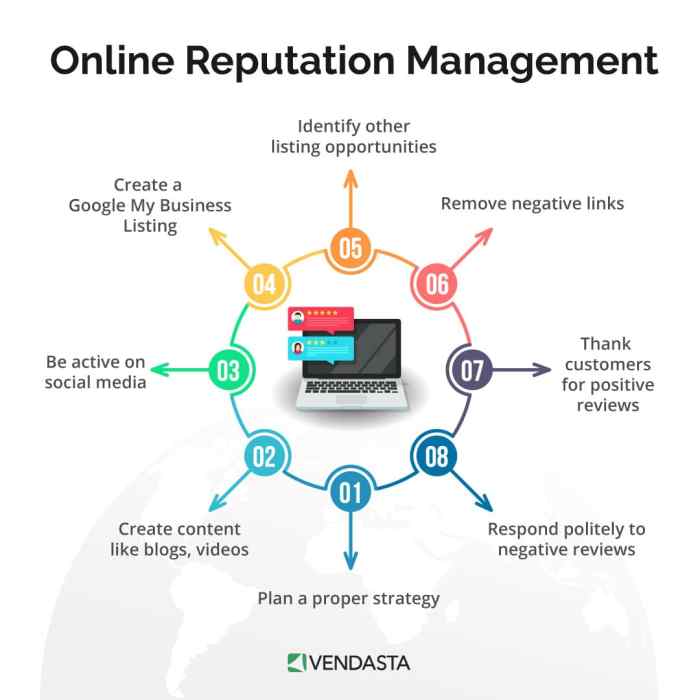Managing Brand Reputation Online takes center stage in the digital world, where businesses thrive or dive based on their online image. Get ready to dive deep into strategies, tools, and tips that will shape your brand’s online reputation.
Importance of Managing Brand Reputation Online

In today’s digital age, managing brand reputation online is more important than ever for businesses. With consumers increasingly turning to the internet to research products and services, a company’s online reputation can make or break its success.
Positive Impact of Good Online Brand Reputation
- Increased Trust: A positive online reputation can build trust with customers, leading to higher conversion rates and repeat business.
- Competitive Advantage: Companies with a strong online brand reputation often have a competitive edge over their rivals.
- Attracting Top Talent: A good reputation can also attract top talent to a company, as job seekers often research a company’s reputation before applying.
Consequences of Ignoring or Mismanaging Brand Reputation Online
- Loss of Customers: Ignoring or mismanaging brand reputation online can result in a loss of customers who may be deterred by negative reviews or scandals.
- Damaged Credibility: A poor online reputation can damage a company’s credibility and make it difficult to recover trust from consumers.
- Impact on Revenue: Ultimately, ignoring brand reputation online can have a direct impact on a company’s revenue and long-term success.
Strategies for Building a Strong Online Brand Reputation: Managing Brand Reputation Online

Building a strong online brand reputation is crucial for the success of any business in today’s digital age. It involves implementing effective strategies to maintain a positive image and engage with customers and the online community. Let’s explore some key strategies for building and maintaining a positive brand reputation online.
Social Media Management
Social media platforms play a significant role in shaping brand perception and reputation. By actively managing social media accounts, responding to customer inquiries and feedback, and sharing valuable content, businesses can enhance their online presence and build trust with their audience.
Content Marketing
Creating high-quality and relevant content can help businesses establish themselves as industry leaders and experts in their field. By consistently publishing valuable content such as blog posts, articles, and videos, businesses can attract and engage their target audience, ultimately strengthening their brand reputation.
Online Reviews Management
Online reviews can significantly impact a business’s reputation. By actively monitoring and responding to reviews on platforms like Google My Business, Yelp, and social media, businesses can address customer concerns and showcase their commitment to customer satisfaction. Encouraging satisfied customers to leave positive reviews can also help boost the brand’s credibility.
Engaging with Customers and the Online Community
Engagement is key to building a strong online brand reputation. By actively interacting with customers, responding to their comments and messages, and participating in online discussions, businesses can foster a sense of community and loyalty among their audience. This personalized approach can help enhance brand reputation and customer trust.
Dealing with Negative Feedback and Crisis Management
Dealing with negative feedback and crisis management is crucial for maintaining a positive online brand reputation. It requires swift action, transparency, and authenticity to address issues effectively and prevent further damage to the brand.
Handling Negative Feedback
Negative feedback can spread quickly online and impact a brand’s reputation. Here are steps to handle negative feedback:
- Monitor social media and review platforms regularly to identify negative feedback.
- Respond promptly and professionally to address the issue and show that you value customer feedback.
- Show empathy and offer solutions to resolve the problem to the customer’s satisfaction.
- Take conversations offline if necessary to prevent further escalation in a public forum.
Crisis Management
In times of crisis, it’s essential to have a solid plan in place to manage the situation effectively. Here are steps for crisis management:
- Acknowledge the issue publicly and take responsibility for any mistakes made.
- Provide regular updates to keep stakeholders informed of the situation and the actions being taken.
- Work with a crisis communication team to develop key messages and responses for different scenarios.
- Show transparency and authenticity in all communications to rebuild trust with customers and the public.
Examples of Successful Turnarounds
Companies like Johnson & Johnson and Tylenol have successfully turned around negative situations by handling crises transparently and authentically. By taking swift action, being open about the issues, and implementing solutions, these companies were able to regain trust and rebuild their brand reputation.
Importance of Transparency and Authenticity, Managing Brand Reputation Online
Transparency and authenticity play a crucial role in addressing issues online. By being transparent about mistakes, showing authenticity in responses, and taking proactive steps to resolve problems, companies can demonstrate their commitment to customers and build a stronger online brand reputation.
Monitoring Tools and Techniques
Monitoring brand reputation online is crucial for businesses to stay ahead of potential issues and maintain a positive image. By utilizing the right tools and techniques, companies can track brand mentions, customer sentiment, and measure the effectiveness of their reputation management strategies.
Sentiment Analysis and Social Listening
- Sentiment analysis involves using AI and machine learning to determine the attitude or emotion behind online mentions of a brand. This helps in understanding how customers perceive the brand and whether the sentiment is positive, negative, or neutral.
- Social listening tools allow businesses to monitor conversations on social media platforms, blogs, forums, and news sites in real-time. By analyzing these conversations, companies can identify trends, address customer concerns, and engage with their audience effectively.
Role of Analytics in Measuring Effectiveness
- Analytics play a crucial role in measuring the impact of brand reputation management strategies. By tracking key metrics such as brand mentions, engagement levels, sentiment scores, and website traffic, companies can evaluate the success of their efforts.
- Through data-driven insights, businesses can identify areas for improvement, optimize their marketing campaigns, and make informed decisions to enhance their online reputation.
